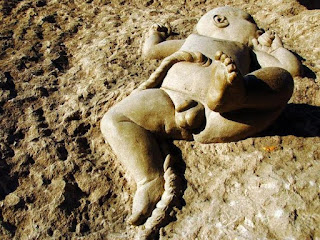Hultner Estrada
 The word “incarnation” provoked
a restlessness among the participants.
In fact, some even left the workshop because they thought the Nehemiah
Center was promoting beliefs in “reincarnation.”
The word “incarnation” provoked
a restlessness among the participants.
In fact, some even left the workshop because they thought the Nehemiah
Center was promoting beliefs in “reincarnation.”
This story happened a few
years ago here in Nicaragua. A course on
Street Psalms Series was being shared and the facilitator spoke about the price
Jesus paid to get close to humanity and… “now we are called to incarnate Christ
in our communities,” repeated the teacher. But the participants didn’t seem to
understand.
Image: "In the begining"
Sculptor: Mike Chapman
The truth is, I myself,
with more than 10 years of pastoral youth ministry didn’t understand
either. It wasn’t until the facilitator
directed us to the passage in John 1:14 that I began to discover the meaning: “The Word became flesh and
made his dwelling among us. We have seen his glory, the glory of the one and
only Son, who came from the Father, full of grace and truth,” recites the text. When we
talk about the incarnation of the Son of God, we are talking about the mysterious
process through which the eternal and infinite Creator of the universe took on
a body of flesh.
As the theologian Juan
Stam explains, the term “flesh” implies not just our biological nature, but
also our vulnerability and even our inclination toward sin. And that is the human nature that the eternal
Word wanted to take on to be born among us.
He was not born with some privileged human nature, immune to the
temptation and anxieties of our human lives like some species of “Superman” or
a divine angel that only appeared to be human.
He was truly human.
But what does it mean
to “incarnate Christ” in our community?
“The Word not only became flesh, but He also lived among us,” explained
the facilitator to me.
Jesus didn’t come for a
short time or just for an event, but he came to stay among us for more than
three decades. He came to walk in our
streets, to put up with the dust, the mosquitos, the scarcity, the heat, the
thirst, and the hunger. He came to live
among us, to listen to our conversations, to participate in the synagogues, to
visit us in our illness, to get involved in the lives of the people day and
night. “And for that decision to live
among us, we were able to discover his glory, his grace, and his truth,” the
facilitator told me.
It was on that occasion
that I realized that if we want people to see the glory, grace, and truth of
God through us, than it is more valuable if we spend time with them, if we walk
together, if we share life together, and that we don’t make ourselves superior
and distance ourselves from the reality that they are living in. Essentially, we want to go to the places
where they are, just as the Son of God did since the first nativity when he
became flesh as Immanuel… “which is translated: God with us” (Matthew 1:23).

Hultner, it's so good to read what is happening with and through the Nehemiah Center. I have such fond memories of being with Joel and you all a few years ago. Blessings friend. Mary Darling
ReplyDelete